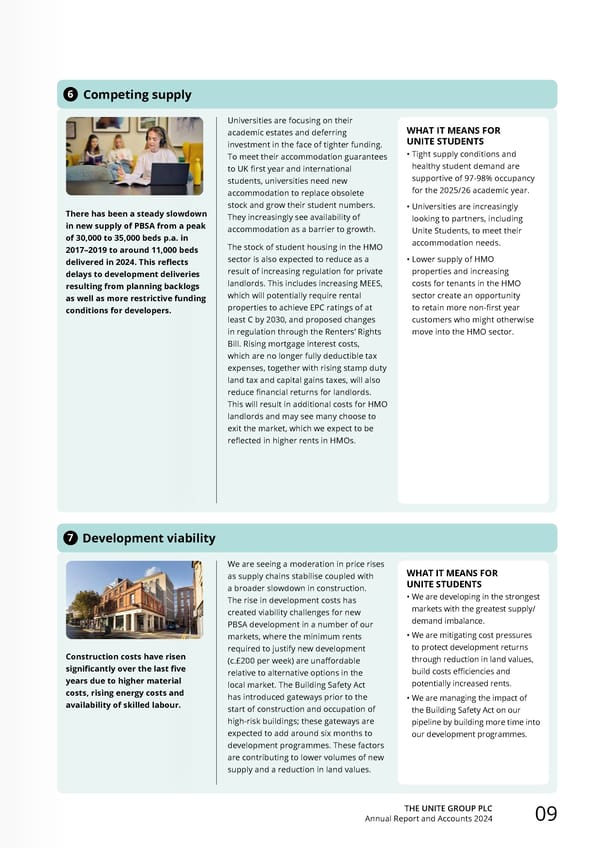THE UNITE GROUP PLC Annual Report and Accounts 2024 09 There has been a steady slowdown in new supply of PBSA from a peak of 30,000 to 35,000 beds p.a. in 2017–2019 to around 11,000 beds delivered in 2024. This reflects delays to development deliveries resulting from planning backlogs as well as more restrictive funding conditions for developers. Competing supply 6 WHAT IT MEANS FOR UNITE STUDENTS • Tight supply conditions and healthy student demand are supportive of 97-98% occupancy for the 2025/26 academic year. • Universities are increasingly looking to partners, including Unite Students, to meet their accommodation needs. • Lower supply of HMO properties and increasing costs for tenants in the HMO sector create an opportunity to retain more non-first year customers who might otherwise move into the HMO sector. Development viability We are seeing a moderation in price rises as supply chains stabilise coupled with a broader slowdown in construction. The rise in development costs has created viability challenges for new PBSA development in a number of our markets, where the minimum rents required to justify new development (c.£200 per week) are unaffordable relative to alternative options in the local market. The Building Safety Act has introduced gateways prior to the start of construction and occupation of high-risk buildings; these gateways are expected to add around six months to development programmes. These factors are contributing to lower volumes of new supply and a reduction in land values. 7 Construction costs have risen significantly over the last five years due to higher material costs, rising energy costs and availability of skilled labour. WHAT IT MEANS FOR UNITE STUDENTS • We are developing in the strongest markets with the greatest supply/ demand imbalance. • We are mitigating cost pressures to protect development returns through reduction in land values, build costs efficiencies and potentially increased rents. • We are managing the impact of the Building Safety Act on our pipeline by building more time into our development programmes. Universities are focusing on their academic estates and deferring investment in the face of tighter funding. To meet their accommodation guarantees to UK first year and international students, universities need new accommodation to replace obsolete stock and grow their student numbers. They increasingly see availability of accommodation as a barrier to growth. The stock of student housing in the HMO sector is also expected to reduce as a result of increasing regulation for private landlords. This includes increasing MEES, which will potentially require rental properties to achieve EPC ratings of at least C by 2030, and proposed changes in regulation through the Renters’ Rights Bill. Rising mortgage interest costs, which are no longer fully deductible tax expenses, together with rising stamp duty land tax and capital gains taxes, will also reduce financial returns for landlords. This will result in additional costs for HMO landlords and may see many choose to exit the market, which we expect to be reflected in higher rents in HMOs.
 Home for Success: Unite Students Annual Report 2024 Page 10 Page 12
Home for Success: Unite Students Annual Report 2024 Page 10 Page 12